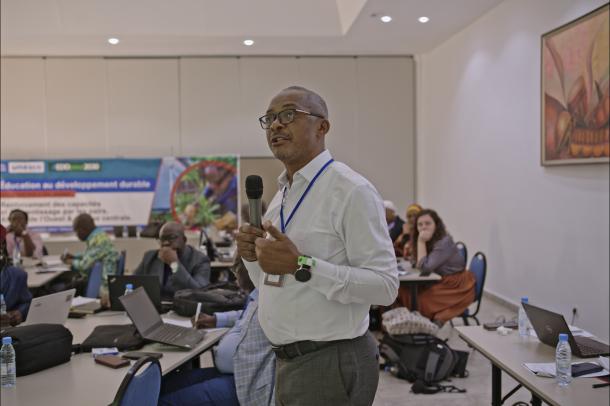On June 17-18, 2025, the seaside town of Saly, Senegal welcomed dialogue and collaboration regarding Education for Sustainable Development (ESD). Delegates from 10 French-speaking countries of West and Central Africa convened to share experiences, build capacity and enhance peer learning on how education can act as a vehicle for sustainability.
In his opening remarks, the representative of the Senegalese national Commission said ESD, a central goal of SDG 4, is not just about knowledge—it must also be values, skills and behaviours that will allow people of all ages to embrace sustainable ways of living.
A Step Toward the ESD for 2030 Roadmap
Jointly organized by UNESCO’s regional offices in Dakar and Yaoundé with support from the Government of Japan, this workshop was a significant step forward in furthering the ESD for 2030 agenda for Africa. Its primary aim was to ground countries in the design, conclusion and implementation of their action plans for ESD, and to help ensure that sustainability is firmly established in education systems.
The countries represented were Cabo Verde, Cameroon, Chad, Congo, Côte d’Ivoire, DRC, Gabon, Mali, Senegal and Togo. Each country delegation reported progress and challenges and they also developed practical approaches relevant to their context.
Principal Priorities: Teacher Development and Engagement of Young People
Reflecting on the discussion, two priorities came through most strongly:
• Teacher development (preparing teachers to be agents of change in communities);
• Engagement of young people (ensuring that they’re contributors to the green economy);
A powerful example was provided by a young entrepreneur from Cameroon, the founder of Family Green Corporation (FGC), who highlighted initiatives in waste management, renewable energy, sanitation, and climate action. His story showed how an ESD approach can unlock the potential of young people and generate practical solutions to environmental and social issues facing our communities.
Shared Tools and Approaches
Participants were introduced to a range of resources that can hasten the integration of ESD into practice, including:
• A virtual toolbox and ESD-Net,
• ESD Learning Objectives,
• Guidelines for “Greening” the Curriculum, and
• Quality Standards for Green Schools.
These resources, in combination with collective peer learning, seek to assist countries in integrating sustainability principles into education and policy frameworks.
Multi-Sector Commitment
The workshop conversations reinforced that education alone cannot achieve sustainable development. Partners, including AFD, UNICEF, UNITAR, Office for Climate Education (OCE), and Wallonia-Brussels, brought their expertise to the discussions, shared financing mechanisms and examples of climate education programs, and outlined models for developing green schools, thus emphasizing a whole-of-sector approach.
Looking Ahead: Developing a Regional Action Plan
At the conclusion of the two-day meeting, participants agreed to carry on with their national ESD initiatives, in partnership with UNESCO, and to discuss the possibility of developing a sub-regional action plan to identify shared needs, strengthen capacity-building, and promote cross-border collaboration.
As the General Delegate of Wallonia-Brussels reminded the group, while we need immediate climate action, what we absolutely need are long-term behavior changes that are cultivated through education and passed down to future generations.
Hence, the Saly workshop created not only an opportunity to deepen collaboration in the region, but also to articulate a shared commitment: to use education as the foundation of sustainability and to guarantee that by 2030, ESD will be a practice common across West and Central Africa rather than an option.












More Stories
CTET February 2026 Re-Exams Set For Two Centres In Bihar
UP Board exams: principal solver held
Noida International University Successfully Organized Educators’ Meet in Durgapur